- Home
- Brian Falkner
Cave Dogs (Pachacuta Book 1) Page 5
Cave Dogs (Pachacuta Book 1) Read online
Page 5
I caught up to Jenny, easier on these wide, flat, terraced steps. ‘How are you feeling?’ I asked.
‘Tired but OK.’ She half smiled. ‘I just feel so wretched about Reiko.’
‘I’m sure she made it,’ I said, failing miserably to sound reassuring. ‘The earthquake went on for quite a while before the roof gave way. She’d have had plenty of time to get away from the edge.’
Jenny nodded ‘I’m sure she’s safe. But I still feel so wretched for her.’
Poor Reiko. Poor, bubbly, kind, Japanese, weather-beaten, incredibly pregnant, Reiko Cray. Jenny was right. Even if she had survived, and I hoped to God she had, the centre of Reiko’s world had gone, crushed under the falling wall of the cavern. There had been so little time to think, and it hadn’t struck me until then, but Jenny was right. I felt wretched as well. Poor Reiko.
The singing stopped abruptly and there was a call from up ahead. We both hurried forwards.
The roof here got lower and lower until eventually you had to drop to your knees and crawl underneath a final ridge. After that though it rose through sheer walls to form a high vaulted chamber.
‘Mary, Mother of God!’ Jenny breathed, and I thought at first she was cursing, then I looked up. A rock formation, I am sure it was just a massive stalagmite, towered over us from an outcropping on the sheer cave wall. It looked for all the world like a statue of Mary, the Catholic version.
‘Jesus,’ I said.
I know that I am exaggerating this, but I do it intentionally to try to convey my feelings at the time. It was just an unusual stalagmite, but the resemblance was there. For six emotionally and physically exhausted teenagers, to come across such a thing, deep beneath the Earth, was a moment of pause. It was almost a religious experience.
Beyond the outcropping from where Mary stood guard was another sight that would have taken our breath away, if we’d had any left to take away.
Two massive gates, floor to ceiling, wall to wall, closed off the far end of the vaulted chamber. It took me a moment to realise they were gates. Huge, black and as solid as the rock itself, but gates they were, with massive hinges of a metal I had never seen before, and a panel of the same metal in the centre, where you would naturally expect to find a handle, or a lock.
‘I think we just found the Gates of Hell,’ Fizzer said, and it turned out later that he was right, although not in the way that he thought.
Tupai had a go at the gates, after Flea had given them a perfunctory test, confirming that they were locked in some manner. Tupai didn’t shoulder charge them the way they do in the movies, you are more likely to break your collarbone that way. He just lined them up, focussed as we had been taught, picked one tree-stump of a leg up off the ground and smashed it into the centre of the gates with a huge roar.
As a karate kick it was impeccable. As a display of raw, brute strength and emotion, it was awe-inspiring. As a gate-opener, it was an abject failure.
The gates held. They shuddered, and a shower of small rocks and stones rained down on his head, but the gates held. He might as well have kicked the wall of the cave.
‘Ow,’ Tupai muttered, and he didn’t try that again.
We sat for a while, contemplating.
‘We could go back,’ Phil said, but no-one listened to him. Fighting our way back up that mighty staircase to the mirror cave, for what? Jenny sat down next to him and slipped her hand into his. The leg that had been crushed by the boulder was turning odd shades of blue and purple in the light of our lamps, but I guessed that was actually a good thing. Blood was flowing. The system was working. And give Phil credit, he had not once complained about the pain. It must have hurt like flaming black shit.
Flea was examining the metallic panel on the gate. On closer inspection we saw that it was covered with inscriptions. Picture style, like the ancient Egyptian hieroglyphics found in pyramids, and yet not like Egyptian markings at all. The gap between the two gates was almost non-existent; you couldn’t have slipped a razor in between the gates, let alone a credit card to raise some kind of latch on the other side.
Tupai had another go then. There were loose boulders scattered over the floor of the cave, residue, no doubt, of the earthquake. He picked up one effortlessly that, quite honestly, I don’t think I would have been able to lift at all, and charged the centre of the gates with it, a home-made battering ram. He let go of the boulder at the last moment, hurling it at the metal panel.
It boomed as it rebounded. The gates shook, a little, and another shower of rocks from above, but the gates looked just as strong and resilient as before.
‘Avon calling,’ Fizzer said with a straight face and we all laughed.
Tupai shook bits of rock from his shoulders and had another go. Same result. He tried a third time, then sat back down with the rest of us.
‘I wonder what’s behind those gates.’ I pondered aloud.
‘Maybe we don’t want to find out,’ Phil intoned cheerlessly, and a gloominess settled over the room. All our lives we are fed this image of hell as a place in the depths of the Earth. For all we knew, on the other side of those gates might be a fiery nest of demons. Logic said no, but little about this expedition so far had cared about what logic might think.
It was Jenny who eventually supplied the solution. ‘Brainy Jenny’ they had called her at intermediate school and it hadn’t been a compliment, even if it was true.
‘Look at the roof,’ she said, ‘Above the right gate.’
We looked and there was a gap. Barely noticeable at first, but I think it had enlarged with all of Tupai’s banging.
‘How are you going to get up there?’ Phil again. Sometimes I thought that Flea might have a point about Phil, or maybe I was just tired, frightened and frustrated.
Jenny was looking at the walls of the cave. Long crevices, black ruts, ran horizontally, high above the ground. Just below them was a long sloping shelf in the rock. ‘I think I can climb that. Let a rope down for you guys to follow.
‘I’ll have a go at it,’ Fizzer said, not meaning to be rude.
Jenny said coolly, ‘I can do it.’
Fizzer nodded and gave her a leg up, onto Tupai’s broad shoulders. She scrambled onto the shelf, pawed away some dust and gravel to give herself a better footing, then reached up to the first crevice.
‘I’ve done lots of rock-climbing,’ she said, probably to herself.
Sure, I thought, at the Rocknasium, on an artificial wall with a harness and a safety rope. Fall from here and you’ll break something you’d rather not break.
Tupai must have thought so too, as he walked along underneath her, his arms raised as if to catch her if she fell. He wasn’t needed.
Jenny got a toehold in the first crevice and reached her fingers up to the second. Like that, she inched her way along the wall of the cave.
The ground fell away as she neared the gates, and the fall would be much worse for her, but she didn’t falter, and she didn’t slip.
She reached the top of the black gate and stuck an arm through the gap, holding herself there as Fizzer tossed the rope up to her. For one horrible second I had a vision of some furious beast on the other side and Jenny falling back into the cave with blood pouring from the stump of her severed arm, but that was only my mind playing tricks on me. My subconscious fears of what we were going to find on the other side of the gates, and whether or not they would lead to a path back to the surface.
‘Anchor the rope around something,’ Jenny called down. ‘I’ll climb down the other side of the gate and find something to tie it off to there, so you can use the rope to climb up.’
It seemed like a good plan, only there was nothing suitable, close enough, to anchor the rope to. So in the end we just anchored it around Tupai.
There were slight scratching noises as Jenny disappeared from sight, and I found myself wondering if we had been right to let her go first, not knowing what we would find.
After a moment though she called out, ‘Pull the rop
e up.’
‘What do you mean?’ Tupai called back, still with the other end of the rope wound around his back.
‘Just pull it up.’ Her voice was hollow and muffled, sneaking through the small gap at the top of the mighty gates.
Tupai shrugged and pulled on the rope. To my immense surprise, and great relief, there was a scraping, sliding noise, and the massive gates themselves drifted open a few centimetres.
Flea pushed on one of them and it opened smoothly. Jenny was standing there looking altogether too pleased with herself.
She showed us. The gates were held by a big beam, held crossways by a couple of brackets, quite similar to those used in castles in days of old. Jenny had simply tied the rope around the massive beam and Tupai had hauled it out of its cradle. It occurred to me then, a little belatedly, that if the crossbeam was on that side of the massive gates, then they were there to keep something out, not to keep something in.
Mary watched us silently as one by one we slipped through, with no idea of what we were expecting to find on the other side.
5. Ambush
By Daniel Scott
The ambush happened about an hour after we passed through the Gates of Hell, as Fizzer insisted on calling them. Just after we found our way out of the labyrinth.
Fizzer reckoned he had this weird ability called intuition, although I suspect it was just another phase he was going through, I have to say though that he was right more often than he was wrong, and on this occasion it was bordering on psychic. The Gates of Hell. That really was their name. It was what was inscribed on the metal panel. Of course it was inscribed in Runa Simi and so we had no way of knowing that at the time.
Jason pushed the huge black gate back into position after we had all passed through. ‘Put the beam back,’ he said thoughtfully.
Phil said, ‘Shouldn’t we leave it open, in case rescuers come down after us?’
‘They won’t.’ Jason was firm. ‘Put the beam back. You always shut a gate after you’ve passed through it.’
‘On a farm!’ Phil protested, but Tupai was already lowering the crossbeam into its cradle.
I couldn’t quite remember when Jason had assumed the role of leader of our desperate little group. He wasn’t the most obvious choice for that position, but we hadn’t had time for an election. I guess he had just made some spur-of-the moment decisions, and they had turned out to be good ones, and so by unspoken mutual consent we all just went along with what he had to say. They say that if you put any group of people in an isolated situation a leader will naturally just float to the surface. I guess Jason just floated to the surface.
I certainly didn’t mind. Jason bought loyalty with loyalty. He won commitment by being committed to you, and he earned respect by respecting others. So maybe those were good traits for a leader. Also he was my friend.
The gates opened onto a corridor. Corridor may be the wrong word. It makes it sound like a brick lined passageway in some old castle, lined with suits of armour and dusty old paintings. This was a natural corridor, perhaps carved out by some pre-historic waterway that no longer existed. There were no straight lines. There was no pattern to it, no order, just a random series of narrow caves that all happened to be going in the same direction.
‘Left or right?’ Jenny asked.
Left was sloping slightly downhill and right slightly uphill.
‘Right,’ Jason said, and as nobody had any objections or better ideas, that was the path we took. I think he chose at random, but there might have been a subconscious desire to go up rather than down, to move closer to the surface, rather than further away from it.
If that was the case it turned out to be a false hope for after barely a hundred metres of twisting, winding corridor, the path dropped steeply, and kept descending, with only a few stretches of climb, for the next forty or fifty metres.
At that point we emerged from what I had taken to be some kind of natural channel, into something that was definitely not. The walls were too flat, the floor too even, even the ceiling of the passage was a defined arch over our heads. There was no question in my mind that we were in a man made tunnel.
Jenny ran her hands over the wall, finding small imperfections with her delicate fingers.
‘These walls have been carved,’ she said.
An eerie feeling started in my toes and travelled right up to the roots of the hair on my head.
Jenny continued, ‘Look. I think these are axe or chisel marks.’
Fizzer was nodding, himself examining the walls. ‘I think there was a natural passageway here, but it’s been enlarged and straightened.’
I squatted and examined the floor, picking up a handful of a fine dust, or sand, and letting it drift through my fingers. The dust covered every part of the floor, and was undisturbed in front of us. Behind us the marks of our passage were obvious.
The going was much easier now, especially for Phil, who was still being helped along by the support of one of the tree limbs that Tupai called arms.
Jason called from up ahead. ‘I’ve found something interesting here.’
Jenny began inexplicably to laugh. I looked at her, illuminating her face in the yellow glare of my helmet torch. She shuddered with laughter for a moment then eventually spluttered, ‘Well, I’m glad about that Jason, because the rest of this trip has just been so goddamn boring.’
I laughed too then, as did the others, and Jason nodded and smiled, as we caught up with him to see what he had found.
A clearly defined doorway lay in the side of the passage, low, indicating, I thought, that the inhabitants were not very tall. Inhabitants, a very interesting thought. If they still existed, it’d be a safe bet that they’d know the way out. The way back to the surface.
There were a series of rooms inside the doorway, with interconnecting holes in the walls like windows. The walls were smoother here, as if plastered.
There was some decayed matting on the floor, made of some kind of reed. Possibly bedding. Embedded in the wall above and to the side of it was an oddly shaped metal hook. There were two such arrangements in the room. The next room was identical, although reversed, and the third room was completely empty and only a quarter of the size.
We stumbled out of the alcove onto the main passageway, all of us in a kind of daze. When you are faced with the incomprehensible your mind tries to comprehend it any way. It conjures up scenarios and tries to fit them to the facts.
It think it was Sherlock Holmes who is supposed to have said, ‘When you have eliminated the impossible, whatever is left, however improbable must be the truth.’ The problem here was that after we had eliminated the impossible, there was nothing left at all..
Aliens seemed one possible solution, although I didn’t share some of Fizzer’s ideas about the human race having originated on another planet. Ancient Maoris seemed plausible – maybe this place had once been much closer to the surface, but had been buried by another earthquake – until I remembered the metal hooks and the panel on the great gates. Ancient Maoris had not had metals. Or had they?
The doorways were low. What about a secret underground invasion by the Japanese during World War II? Somehow that didn’t seem to gel either. I decided to stick with space aliens until a more likely solution presented itself.
The corridor proved to be lined with doorways, and each contained a set of rooms just like the first. The Japanese Army theory gained weight in my mind as the whole place did have the feeling of a kind of barracks.
Tupai had his own theory. ‘I think it’s a secret underground bunker for Government Ministers in case of a nuclear attack,’ he said, peering inside the fourth or fifth of the alcoves we had passed.
‘Hell of an entrance-way,’ Phil said, (funny when you thought about it later).
‘Maybe we came in the back door.’ Tupai growled.
‘Aliens,’ Fizzer said. I rolled my eyes even though that was currently my theory of choice. ‘Maybe this is a laboratory, where they bred the human race
as we now know it.’
‘CIA,’ Phil interjected. ‘They’ll be behind this in some way.’
‘I quite liked the nuclear shelter idea,’ Jenny contributed.
‘What about the writing on the big gates?’ Jason was trying to be sensible.
‘Maybe it’s a code,’ Tupai was pleased that someone else liked his theory.
‘CIA, without doubt.’ Phil again.
‘Only if the CIA have started using spears,’ Jason said, and the rest of us silently crowded around to look.
It must have been the sixth or seventh alcove that we had investigated, and in the first bedroom, as I had started thinking of them, lying on the floor below the hook, was a long thin pole. One end of it looked rough and broken and beside it was what could only be a spearhead.
Jason picked up the broken spear and fitted the spearhead to it. It was obviously a match. He held the spear to the hook on the wall, and the function of that device suddenly became obvious. My idea of barracks seemed to be gaining ground.
‘Aliens,’ said Fizzer emphatically, with his tongue firmly in his cheek, and I had the slightly mad thought that if aliens had the technology to fly through space, but slept on matting and used spears for weapons, then I would be interested to know what they did for entertainment.
I told you it was a slightly mad thought.
Jason handed the spear shaft to me, and I hefted it. It was light, yet sturdy and I idly thought that it was about the right size for a bo. It was also a good size for a crutch, so I passed it to Phil, and he found he was able to progress without quite so much dependence on Tupai.
Not far ahead of that discovery we came to a side passage. We took it, and found it had side passages of its own. They had side passages, and so on and so on. Fizzer called it a labyrinth, although I suspect that it was more like a small town for which we did not have a road map. Drop a stranger in the centre of Auckland without a roadmap and they’d probably call that a labyrinth too.
We’d probably still be there now if it wasn’t for the dust on the floor. It was easy to see where we had been and so we just kept checking out each passage and each passage off that, until we eventually came to a much larger passage, a natural cave again, although there were some parts that seemed to have been widened for easy passage, and the floor had obviously been levelled. Once again it was coated with the thick dust or sand.

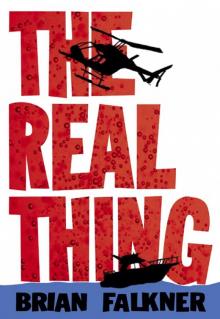 The Real Thing
The Real Thing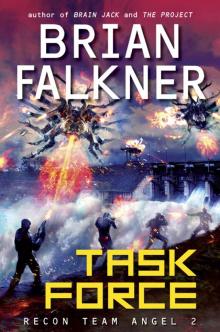 Task Force
Task Force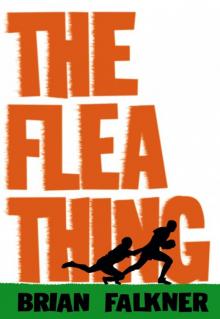 The Flea Thing
The Flea Thing The Project
The Project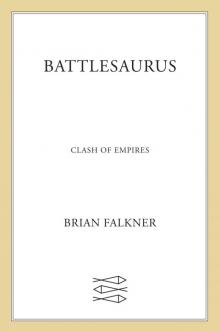 Clash of Empires
Clash of Empires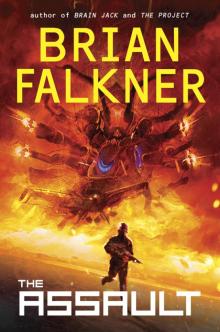 The Assault
The Assault Brain Jack
Brain Jack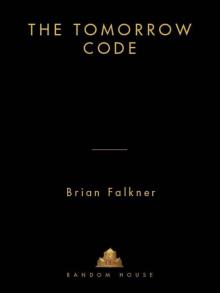 The Tomorrow Code
The Tomorrow Code Vengeance
Vengeance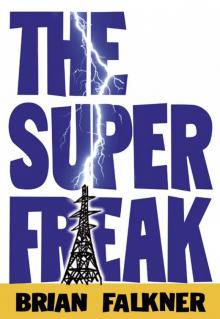 The Super Freak
The Super Freak Northwood
Northwood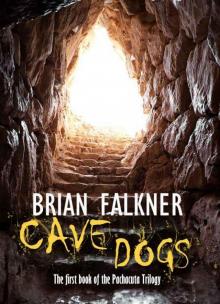 Cave Dogs (Pachacuta Book 1)
Cave Dogs (Pachacuta Book 1)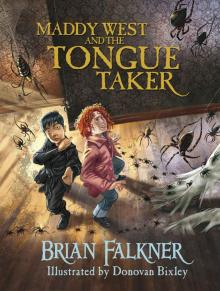 Maddy West and the Tongue Taker
Maddy West and the Tongue Taker